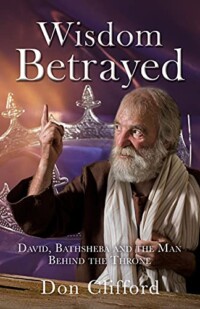
Wisdom Betrayed: David, Bathsheba and the Man Behind the Throne
by Don Clifford
Xulon Press Elite
book review by Mihir Shah
“Everyone loved King David…. ‘But you know, after a while… I don’t know, I think he did begin to change.'”
The story of young David slaying Goliath is the ultimate underdog tale and arguably the most renowned one from the Bible. His remarkable faith propels him, but as king, he becomes so consumed with himself that he fails to see the consequences of his actions on those that are near and dear to him. In Clifford’s text, David and Bathsheba’s story is probed in minute detail, as is the devastating fallout that ensues. Though fictional, the narrative asks probing questions that will force audiences to rethink the parameters of the David and Bathsheba story at a much deeper level.
The novel revolves around a culmination of sins committed by King David, but especially one lustful act that throws several lives into tumult. While surveying the gardens of his kingdom one day, David sees Bathsheba bathing in a private area made for her by her husband, Uriah. At that moment, Uriah is on the battlefield as part of King David’s Thirty Mighty Men. What is downright baffling is the revelation that David knew Bathsheba to be the wife of Uriah and the daughter of Eliam—another member of the Thirty Might Men. She is even the granddaughter of David’s dearest advisor, Ahithophel. Utterly blinded by his power, David commits, for all intents and purposes, rape, setting off a chain reaction that will ultimately put the throne at stake.
To see how the narrative arc progresses in parallel to that of the scriptures is interesting, yet the adherence to scripture never interrupts the flow of Clifford’s work. On the contrary, the segment and conversation between Nathan and Ahithophel that convinces the latter that he must leave David’s palace in a form of self-exile is written in riveting and seamless prose.
Delving into the faith component, it is remarkable to discern the introspective and philosophical nature of God and the sins that certain humans are allowed to get away with. On the one hand, there’s Uriah, the ever-loyal soldier and doting husband who prays for Bathsheba’s well-being, while on the other, there’s David, who doubles down on his vile behavior by inviting Bathsheba and Ahithophel to stay in the palace. What drives a man, even a good man, to such actions? Why do good men and women become victims of evil doings? There are a plethora of thought-provoking questions in the book that are explored in deeper layers than the scripture itself.
As the story progresses, the notions of coming full circle and karma become more and more apparent, whether it be in the actions of Amnon toward his sister, Tamar, or Absalom’s impending rebellion. Thinking further, one cannot fathom how a man, a king and formerly deep man of faith, cannot yet seek repentance for his actions despite seeing his house in disarray. Nevertheless, Ahithophel’s story and role in David’s demise are not yet done, and in much the same way that David betrayed the wisdom that Ahitphel bestowed upon him, Ahithophel fuels with vengeance. The entire narrative ultimately adds more color to the scripture and goes into greater character development to allow modern-day readers a fuller picture of the classic biblical narrative.